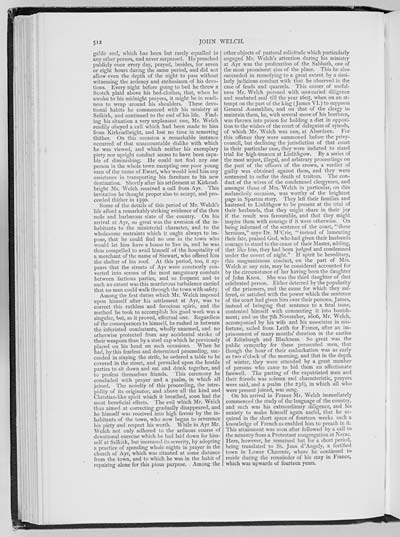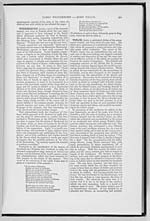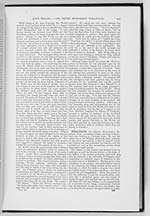Volume 3 > Half-Volume 6
(158) Page 512
Download files
Individual page:
Thumbnail gallery: Grid view | List view

512 gable zeal, which has been but rarely equalled in any other person, and never surpassed. He preached publicly once every day, prayed, besides, for seven or eight hours during the same period, and did not allow even the depth of the night to pass without witnessing the ardency and enthusiasm of his devo- tions. Every night before going to bed he threw a Scotch plaid above his bed-clothes, that, when he awoke to his midnight prayers, it might be in readi- ness to wrap around his shoulders. These devo- tional habits he commenced with his ministry at Selkirk, and continued to the end of his life. Find- ing his situation a very unpleasant one, Mr. Welch readily obeyed a call which had been made to him from Kirkcudbright, and lost no time in removing thither. On this occasion a remarkable instance occurred of that unaccountable dislike with which he was viewed, and which neither his exemplary piety nor upright conduct seems to have been capa- ble of diminishing. He could not find any one person in the whole town excepting one poor young man of the name of Ewart, who would lend him any assistance in transporting his furniture to his new destination. Shortly after his settlement at Kirkcud- bright Mr. Welch received a call from Ayr. This invitation he thought proper also to accept, and pro- ceeded thither in 1590. Some of the details of this period of Mr. Welch's life afford a remarkably striking evidence of the then rude and barbarous state of the country. On his arrival at Ayr, so great was the aversion of the in- habitants to the ministerial character, and to the wholesome restraints which it ought always to im- pose, that he could find no one in the town who would let him have a house to live in, and he was thus compelled to avail himself of the hospitality of a merchant of the name of Stewart, who offered him the shelter of his roof. At this period, too, it ap- pears that the streets of Ayr were constantly con- verted into scenes of the most sanguinary combats between factious parties, and so frequent and to such an extent was this murderous turbulence carried that no man could walk through the town with safety. Among the first duties which Mr. Welch imposed upon himself after his settlement at Ayr, was to correct this ruthless and ferocious spirit, and the method he took to accomplish his good work was a singular, but, as it proved, effectual one. Regardless of the consequences to himself, he rushed in between the infuriated combatants, wholly unarmed, and no otherwise protected from any accidental stroke of their weapons than by a steel cap which he previously placed on his head on such occasions. When he had, by this fearless and determined proceeding, suc- ceeded in staying the strife, he ordered a table to be covered in the street, and prevailed upon the hostile parties to sit down and eat and drink together, and to profess themselves friends. This ceremony he concluded with prayer and a psalm, in which all joined. The novelty of this proceeding, the intre- pidity of its originator, and above all the kind and Christian-like spirit which it breathed, soon had the most beneficial effects. The evil which Mr. Welch thus aimed at correcting gradually disappeared, and he himself was received into high favour by the in- habitants of the town, who now began to reverence his piety and respect his worth. While in Ayr Mr. Welch not only adhered to the arduous course of devotional exercise which he had laid down for him- self at Selkirk, but increased its severity, by adopting a practice of spending whole nights in prayer in the church of Ayr, which was situated at some distance from the town, and to which he was in the habit of repairing alone for this pious purpose. Among the other objects of pastoral solicitude which particularly engaged Mr. Welch's attention during his ministry at Ayr was the profanation of the Sabbath, one of the most prominent sins of the place. This he also succeeded in remedying to a great extent by a simi- larly judicious conduct with that he observed in the case of feuds and quarrels. This career of useful- ness Mr. Welch pursued with unwearied diligence and unabated zeal till the year 1605, when on an at- tempt on the part of the king (James VI.) to suppress General Assemblies, and on that of the clergy to maintain them, he, with several more of his brethren, was thrown into prison for holding a diet in opposi- tion to the wishes of the court of delegates of synods, of which Mr. Welch was one, at Aberdeen. For this offence they were summoned before the privy- council, but declining the jurisdiction of that court in their particular case, they were indicted to stand trial for high-treason at Linlithgow. By a series of the most unjust, illegal, and arbitrary proceedings on the part of the officers of the crown, a verdict of guilty was obtained against them, and they were sentenced to suffer the death of traitors. The con- duct of the wives of the condemned clergymen, and amongst those of Mrs. Welch in particular, on this melancholy occasion, was worthy of the brightest page in Spartan story. They left their families and hastened to Linlithgow to be present at the trial of their husbands, that they might share in their joy if the result was favourable, and that they might inspire them with courage if it were otherwise. On being informed of the sentence of the court, "these heroines," says Dr. M'Crie, "instead of lamenting their fate, praised God, who had given their husbands courage to stand to the cause of their Master, adding, that like him, they had been judged and condemned under the covert of night." If spirit be hereditary, this magnanimous conduct, on the part of Mrs. Welch at any rate, may be considered accounted for by the circumstance of her having been the daughter of John Knox. She was the third daughter of that celebrated person. Either deterred by the popularity of the prisoners, and the cause for which they suf- fered, or satisfied with the power which the sentence of the court had given him over their persons, James, instead of bringing that sentence to a fatal issue, contented himself with commuting it into banish- ment; and on the 7th November, 1606, Mr. Welch, accompanied by his wife and his associates in mis- fortune, sailed from Leith for France, after an im- prisonment of many months' duration in the castles of Edinburgh and Blackness. So great was the public sympathy for these persecuted men, that though the hour of their embarkation was as early as two o'clock of the morning, and that in the depth of winter, they were attended by a great number of persons who came to bid them an affectionate farewell. The parting of the expatriated men and their friends was solemn and characteristic, prayers were said, and a psalm (the 23d), in which all who were present joined, was sung. On his arrival in France Mr. Welch immediately commenced the study of the language of the country, and such was his extraordinary diligence, and his anxiety to make himself again useful, that he ac- quired in the short space of fourteen weeks such a knowledge of French as enabled him to preach in it. This attainment was soon after followed by a call to the ministry from a Protestant congregation at Nerac. Here, however, he remained but for a short period, being translated to St. Jean d'Angely, a fortified town in Lower Charente, where he continued to reside during the remainder of his stay in France, which was upwards of fourteen years.
Set display mode to:
![]() Universal Viewer |
Universal Viewer | ![]() Mirador |
Large image | Transcription
Mirador |
Large image | Transcription
Images and transcriptions on this page, including medium image downloads, may be used under the Creative Commons Attribution 4.0 International Licence unless otherwise stated. ![]()
| Biographical dictionary of eminent Scotsmen > Volume 3 > Half-Volume 6 > (158) Page 512 |
|---|
| Permanent URL | https://digital.nls.uk/74514590 |
|---|---|
| Attribution and copyright: |
|
| Description | Volume III. Contains names alphabetically from Macadam to Young. |
|---|

